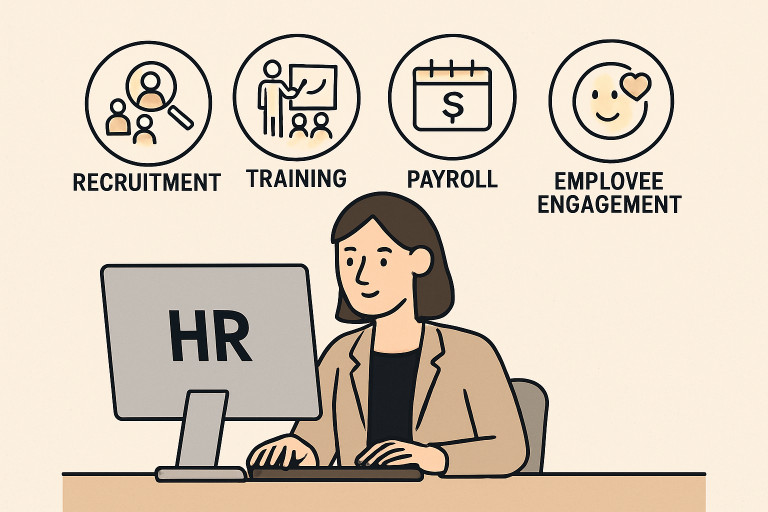Reviews
Businesses Accelerate Adoption of Digital HR Tools to Boost Efficiency

Today’s HR professionals face the challenge of balancing strategic decision-making with time-consuming administrative tasks. Embracing digital solutions enables HR teams to manage workflows more efficiently, automate repetitive duties, and create a better experience for employees. This adoption is especially important for small and medium-sized businesses looking to modernize without heavy investments, often turning to low-cost HRIS options for SMBs that make advanced HR functions accessible and affordable.
Organizations leveraging HR technology can foster closer collaboration, improve data accuracy, and deliver enhanced employee engagement. Automating routine processes frees HR personnel to focus on developing talent, nurturing a positive company culture, and supporting long-term business objectives. As digital platforms continue to evolve, integrating them into daily tasks becomes a key driver of HR transformation and sustainable organizational success.
Digital HR tools are revolutionizing every stage of the employee lifecycle. Their practical applications enable companies of all sizes to compete for top talent, retain high performers, and comply with complex regulations while reducing overhead.
Many organizations can further increase efficiency by integrating digital HR solutions with other business systems to create a unified ecosystem of data and insights. This approach supports improved decision-making and empowers leaders to respond quickly to workforce and market changes.
Automating Recruitment and Onboarding
Recruiting the right talent and welcoming them effectively are foundational to organizational growth. Digital recruitment platforms such as applicant tracking systems (ATS) automate the review, filtering, and communication processes for candidates, streamlining the entire hiring lifecycle. These platforms can post job openings to multiple boards simultaneously, screen resumes for ideal qualifications, and help coordinate interview scheduling—all with minimal manual input.
Digital onboarding tools further reduce the administrative burden by guiding new hires through paperwork and compliance training before their first day. This efficiency accelerates acclimation, ensuring employees feel informed and supported from their very first interactions. Digital records and checklists also minimize errors, making compliance easier for HR teams and providing a safer organization.
Enhancing Employee Training and Development
The need for continuous employee learning is greater than ever. Learning management systems (LMS) provide HR with a centralized hub for delivering and tracking development programs. They enable self-paced learning, interactive training modules, and gamified content, which can increase participation and retention. Through data analytics, these platforms identify skill gaps and inform the development of tailored learning pathways for employees.
By making upskilling opportunities accessible and measurable, companies can better adapt to the evolving demands of their industry. Modern LMS solutions also allow managers to monitor team progress in real-time and adjust training goals accordingly.
Streamlining Performance Management
Outdated annual review cycles can be replaced by digital platforms that encourage ongoing communication and feedback. Performance management systems provide tools for setting clear objectives, conducting regular check-ins, and tracking progress toward goals. These platforms foster accountability and transparency, aligning individual performance with company objectives.
Through real-time dashboards and analytics, leaders can identify high performers, recognize coaching opportunities, and make informed decisions about promotions or succession planning based on current, data-driven insights.
Improving Payroll and Benefits Administration
Handling payroll and benefits manually is error-prone and time-consuming. Digital solutions streamline payroll by automating calculations, deductions, and compliance documentation. Employees benefit from self-service portals, where they can view pay statements, update tax information, and enroll in benefits programs at their convenience.
These advancements reduce administrative tasks and enable HR professionals to focus on employee engagement. For industries with complex payroll needs, digital platforms ensure compliance with changing tax laws, labor regulations, and reporting requirements.
Leveraging AI for HR Service Delivery
AI-powered tools are redefining how HR teams deliver services. Modern chatbots efficiently field questions about policies, leave balances, and benefits, providing employees with instant, accurate responses around the clock. HR staff can then allocate more time to strategic initiatives such as culture building and workforce planning.
Innovations like SAP’s Joule go beyond simple Q&A to offer personalized guidance and contextual recommendations, enhancing both user experience and HR team productivity. These tools are rapidly becoming standard as companies seek to modernize their HR service models.
Fostering Employee Well-being Through Digital Tools
Prioritizing employee well-being is central to organizational success and retention. Digital platforms can monitor work patterns, flag potential risks of burnout, and deliver timely resources for mental and physical health. Self-service access to support sessions, learning modules, or wellness content allows employees to take proactive steps towards balance and resilience.
Advanced AI can even analyze real-time workplace data to intervene early when engagement or satisfaction dips. Such capability enables organizations to cultivate a culture of care, driving sustained productivity and efficiency.
Data-Driven Decision-Making in HR
Leveraging data is fundamental to effective HR management. Today’s digital solutions put powerful analytics at managers’ fingertips, tracking KPIs such as retention rates, diversity measures, and training effectiveness. With this level of insight, HR can spot trends, predict staffing needs, and benchmark the impact of initiatives.
These metrics transform HR from a support function to a strategic partner, equipping leaders to make informed, impactful decisions that align with business strategy.
Conclusion
The increasing adoption of digital solutions in HR is driving a new era of efficiency, agility, and employee empowerment. With streamlined administration, smarter analytics, and advanced AI, HR departments are better positioned to champion workforce development and organizational growth. By embracing these tools, organizations can ensure that employees are supported throughout their journey, resulting in higher engagement, lower turnover, and a competitive edge in today’s talent market.

-

 Legal6 days ago
Legal6 days agoMichigan man JD Vance sentenced to 2 years for threatening Trump and JD Vance
-

 Politics1 week ago
Politics1 week agoU.S. to designate Maduro-linked Cartel de los Soles as terrorist organization
-

 Health7 days ago
Health7 days agoCambodia reports fatal H5N1 bird flu case in 22-year-old man
-

 World4 days ago
World4 days agoHurricane Melissa registered 252 mph wind gust, breaking global record
-

 Legal4 days ago
Legal4 days agoWoman in critical condition after being set on fire on Chicago train
-

 Politics7 days ago
Politics7 days agoEpstein survivors release PSA calling on Congress to release all files
-

 Legal4 days ago
Legal4 days ago1 dead, 2 injured in shooting at Dallas Walmart parking lot
-

 Legal3 days ago
Legal3 days agoSuspect in San Diego stabbing shot by authorities after fleeing into Mexico




